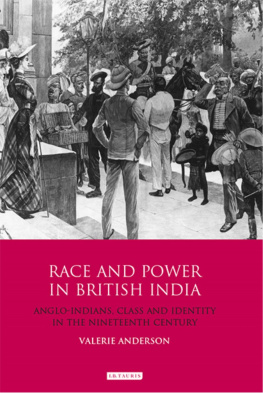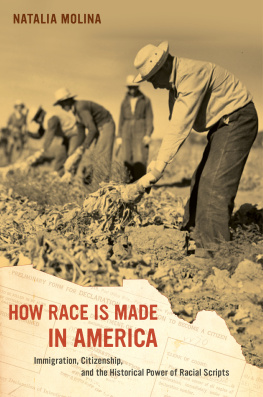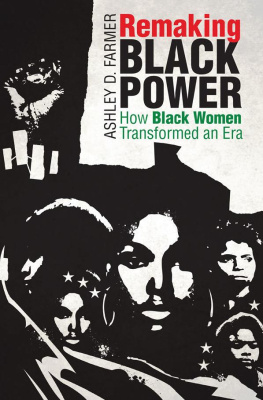Making Race, Making Power
Making Race, Making Power
North Carolinas Road
to Disfranchisement
KENT REDDING
University of Illinois Press
URBANA AND CHICAGO
2003 by the Board of Trustees
of the University of Illinois
All rights reserved
Manufactured in the United States of America
C 5 4 3 2 1

This book is printed on acid-free paper.
Library of Congress Cataloging-in-Publication Data
Redding, Kent, 1962
Making race, making power : North Carolinas road to
disfranchisement / Kent Redding.
p. cm.
Includes bibliographical references and index.
ISBN 0-252-02808-2 (cloth : alk. paper)
1. African AmericansSuffrageNorth CarolinaHistory.
2. Power (Social sciences)North CarolinaHistory.
3. Democratic Party (N.C.)History. 4. North Carolina
Politics and government18651950. I. Title.
JK1929.N8R43 2003
324.6'2'089960730756dc21 2002010953
For Colleen
Contents
Acknowledgments
In the researching and writing of this book, I have incurred numerous debts. The dissertation from which this book originated benefitted greatly from discussions with and careful readings from Richard Simpson, Judith Blau, and Craig Calhoun, as well as some early methodological help from Kenneth Bollen. Peter Bearman deserves special thanks for his many contributions and support throughout. I would also like to thank Kevin Everett, Walter Davis, and Kate Stovel for their intellectual encouragement and moral support in this early stage of the project. Michael Schwartz, whose book on the Southern Farmers Alliance first got me interested in this topic, also was very helpful early on.
Colleagues at Indiana University and elsewhere influenced my thinking and writing in ways too numerous to recount here, as I revised and expanded the project. My thanks to Rick Valelly, Pamela Walters, David Zaret, Tom Gieryn, Jason Jimerson, David Strong, Joshua Klugman, Larry Isaac, and members of the Indiana University Political Economy Workshop, who read parts or all of later drafts and made valuable suggestions. Joseph Gerteis, Erin Maher, Joshua Klugman, and Rachael Barlow provided helpful and able research assistance. A special thanks also to David James for his unwavering intellectual and moral support and for uncounted discussions about the vagaries of southern politics and recent collaborations that have taught me so much. In addition, I thank the staffs of the North Carolina Collection at the University of North Carolina at Chapel Hill and the North Carolina State Division of Archives and History for helping me track down voluminous organizational and county records.
Richard Martin, my editor, was very encouraging and patient as the manuscript moved to publication stages, and for that I am truly grateful. Let me also thank the reviewers of the book, J. Morgan Kousser, Orville Vernon Burton, and Dwight Billings. Prof. Burtons review was masterful at enthusiastically supporting the basic aims of the book even as he helped me see the work in a new light and suggest how to better navigate the thickets of southern historiography. I also acknowledge my copy editor, Steve Barnett, who made this a more readable book.
Ultimately, this book could scarcely have been written without all of this collective help. Unfortunately, any remaining errors must remain my responsibility alone.
I have a special debt to Colleen Foley, who also lived with this project, but somehow maintained her patience, her sense of humor, and her faith in me and my work. For all her support, I humbly thank her. For Mara, Leah, and Natalie, who were born in the midst of it all but, miraculously, seem none the worse for it, I can only offer that their presence at the beginning and end of each day was, and continues to be, a wonderful gift.
* * *
appeared in an earlier version as Failed Populism: Movement-Party Disjuncture in North Carolina, 1890 to 1900, American Sociological Review 57.3 (June 1992): 34052.
Introduction
The U.S. civil rights movement is among the most-studied and best-understood political movements, as scholars have tried to learn how a seemingly powerless group mobilized to challenge racial segregation and retrieve a most fundamental right, the right to vote. It is curious, then, that we know comparatively less about the collective mobilization to implement disfranchisement and segregation in the South than we know about the social movement to end them.
It may seem odd to center attention on how powerful southern whites collectively mobilized to disfranchise poor and powerless southern blacks in the late nineteenth century. To many, the story of southern politics may seem so obvious that it hardly needs explaining. Accounts of late-nineteenth-century southern politics, as in many political narratives, often make use of a contest model that explains outcomes in terms of institutional position, economic resources, or numbers of voters, rather than in terms of processes involving the collective mobilization of power. These accounts tend to assume the preexistence of categorical interests that array themselves into clear battle lines: white versus black; landlord versus tenant; Democrat versus Republican. In these contests, the eventual victories of southern whites, landlords, and Democrats in imposing a one-party racial caste system look easily predictable, in retrospect, a result of the apparent deployment of overwhelming power of one group over another.
That these clear victories generally did not come until the 1890s and early 1900s, long after the end of Reconstructionlong after white Democrats had regained control over southern state governmentsraises interesting questions. Why did it take so long? Why did the dominant race, class, and party fail to fully impose formal disfranchisement and segregation earlier, after regaining control of state governments at the end of Reconstruction in the 1870s? Why were blacks allowed to vote at a rate of greater than 60 percent through the 1880s and better than 40 percent in 1892 even as they challenged elite white rule?
This books answer to such questions is that white Democratic elites in North Carolina (and to some extent elsewhere in the South) were initially divided with respect to political motivations and strategies. Gaining and maintaining power under changed and changing postwar conditions was no simple task, no simple product of clearly delineated class, race, or even partisan interests. Elites had to adapt their methods of organizing political support as well as their methods of demobilizing opponents. These adaptations in elite political mobilization strategies developed only in opposition to the surprisingly powerful and innovative challenges of blacks and Populists, even as Democrats sometimes learned from and mimicked them. Disfranchisement came late in part because the lines of battle and even the goals were initially unclear. The paths to political power would have to be reconstructed on new terrain. That reconstruction required new ways of collectively mobilizing political support not only by southern insurgents but by southern elites as well.
If we put the problematic of mobilization at the center of the analysis of southern disfranchisement we learn new things about southern history. Examining how elites, not just challengers, collectively organize is central. To get the full benefit of the insights from previous civil rightsbased and other mobilization studies we must go beyond them to focus on elite collective action and its interaction with challengers. In attempting to create power in the course of electoral, and later, disfranchisement campaigns, white Democratic elites faced collective action problems much like those of insurgent black Republicans and Populists. Their eventual victories, the adoption and implementation of legal disfranchisement and segregation, resulted not merely from the deployment but from the







 This book is printed on acid-free paper.
This book is printed on acid-free paper.